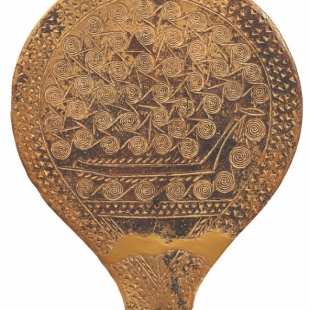Two great civilizations share a cup of knowledge


In fact, the word rhyton comes from the Greek word rhein, which means "to flow through", thus the two openings on each end of the vessel. Judging by all evidence, it seems that the same words could also be said of ancient Greek civilization itself, which had either trickled or flooded its way across continents and ages to enable a meeting between an ocean civilization and its many land counterparts.
The Nanjing Museum exhibition concluded with a small chapter dedicated to Alexander the Great (356-323 BC), the king of Macedonia — Macedonia being a Greek city-state — and an invincible warrior who, remarkably, harbored a tolerant side and believed in a multicultural society. By sacrificing to the gods of his conquered land and honoring their traditions, Alexander greatly expanded the influence of ancient Greek civilization in a way that also allowed for "a creative synthesis of cultures", to use the words of Angeliki Kottaridi, a highly regarded Greek archaeologist.
In 327 BC, seven years after Alexander invaded the Achaemenid Persian Empire, Alexander married Roxana, a Sogdian princess, despite opposition from those close to him who would have preferred a Macedonian or other Greek to become queen. The ancient Sogdians were an Eastern Iranian people who inhabited the region of Sogdiana in modern-day Central Asia, from where they later embarked on their Silk Road journeys.
However, Alexander, whose ultimate goal was to reach the "ends of the world and the Great Outer Sea", didn't stop there. He invaded India the very next year but eventually turned back at the Beas River in Punjab at the demand of his homesick troops. He died in 323 BC in Babylon, not knowing that there was a whole wide world lying beyond his "ends of the world".





































